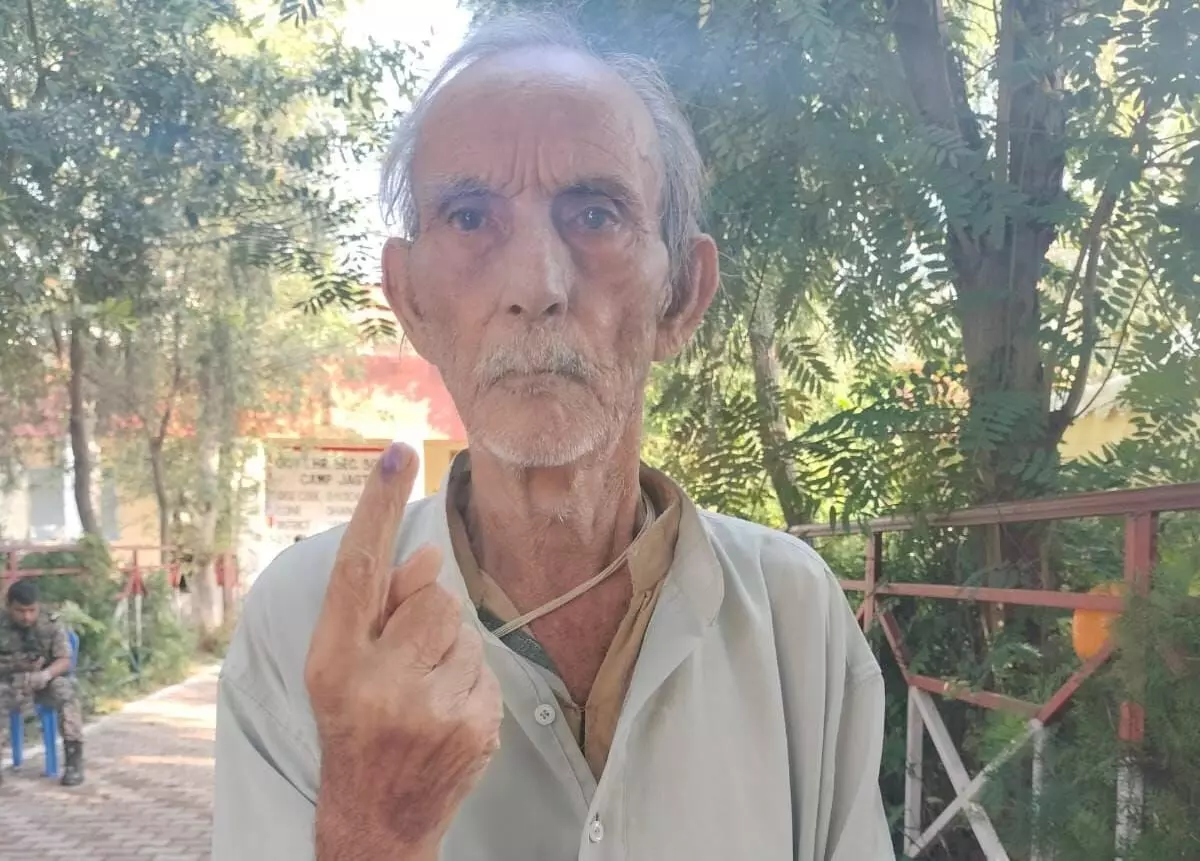J-K polls: Displaced Kashmiri Pandits vote with hope of return to their homeland
Seventy-six-year-old Badri Nath, participated in several parliamentary and assembly elections, voted optimistically in Jammu and Kashmir
By Newsmeter Network
Jammu and Kashmir Assembly elections: Kashmiri pandits vote
Jammu: Thousands of displaced Kashmiri Pandits on Tuesday once again cast their vote with the hope that the new government in Jammu and Kashmir will facilitate their return to the Kashmir valley.
Seventy-six-year-old Badri Nath, who have participated in several parliamentary and assembly elections, voted optimistically in the third and last phase of assembly polls, expressing a wish for the restoration of his home in the valley.
"I am voting once again in the hope that the new government will deliver justice to our community by fulfilling the demand to return to our homes in the valley," said Nath, who originally hails from North Kashmir's Bandipora district, after casting his vote at a polling station in Muthi in Jammu district.
Criticizing past governments for their failure to address the issue, he said, "The governments led by Farooq Abdullah in 1996, followed by Mufti Sayeed and Ghulam Nabi Azad from 2002 to 2008, Omar Abdullah in 2009, and Mehbooba Mufti-BJP in 2014 failed to address the rehabilitation issue."
He added that successive Congress and BJP governments at the Centre also made minimal efforts to fulfil their demands.
"We hope that our next voting will be in Kashmir," Nath said.
A majority of nearly three lakh members of the community reside in Jammu and Delhi, who have been living in exile for 35 years since the insurgency in Kashmir forced them to leave their homeland.
Like Nath, young entrepreneur Vikas Raina, whose father, a principal, was assassinated by Hizb-ul-Mujahideen terrorists along with two lecturers in 1997, voted in Sopore constituency along with his wife Jagriti, hopeful that the government would not only implement rehabilitation plans in Kashmir but also ensure employment opportunities for the youth.
"It is crucial to ensure the rehabilitation of Kashmiri Pandits as soon as possible. Alongside job opportunities in both government and private sectors, youths should also be provided land and loans to start business in the valley," Raina emphasized.
He said that over 6,000 employees, who have been recruited under the special PM employment package, should be settled in one-place township as part of the rehabilitation.
Over 18,000 Kashmiri Pandits were registered to vote in the third and final phase of elections across 16 assembly segments in three districts of North Kashmir. "By 3 PM, over 25 per cent of Kashmiri Pandits voted at various polling stations in Jammu, Delhi, and Udhampur," Relief Commissioner Dr Arvind Karwani to PTI.
The majority of Kashmiri Pandits reside in four camps in Jagti, Nagrota, Muthi, and Purkhoo areas of Jammu district, with Jagati alone housing around 20,000 residents.
Sixty-seven-year-old Surinder Dhar, who fled his home in a remote hamlet in North Kashmir's Kupwara district in 1990, expressed his wish to return to his roots with his vote. "But our demand for 'ghar wapsi' (homecoming) is yet to be addressed. We hope the new government will address this."
The Election Commission established 24 special polling stations for Kashmiri Pandit voters in Jammu, one in Udhampur, and four in Delhi. Kashmiri Pandits across India, including those in Jammu and Udhampur, continue to vote for candidates in their home constituencies in Kashmir to maintain their connection with the valley.
Every year on January 19, Kashmiri Pandits commemorate their "exile" from the valley.
Many youngsters, including first-time voters Kushi from Baramulla and Neha from Kupwara, also cast their votes at polling stations in Jagti and Nagrota camps.
They said that their votes were not just for the permanent rehabilitation of Kashmiri Pandits but also for a "stable and strong" government capable of addressing both domestic and international challenges, and ensuring the eradication of terrorism.
(Inputs from PTI)